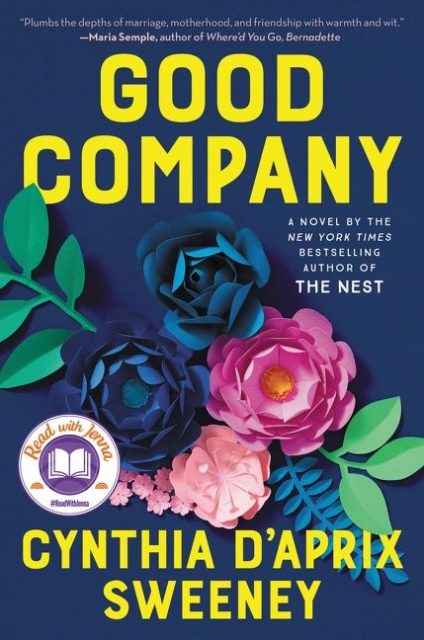An unfortunate reality of life is that almost half of all marriages fail. It’s sad but true, and it’s good business for divorce lawyers. Some couples make it and some don’t, for a myriad of different reasons from cheating, money problems and the inability to have children, to abuse of any kind. That said, some manage to deal with and get past their troubles, opting to forgive and stay together as opposed to breaking up their legal cohabitation. Then again, it’s obviously not that ‘simple’ for some.
Why am I talking about marriage and divorce? Well, marriage problems are the basis of the new novel, Good Company, by Cynthia D’Aprix Sweeney. The author of The Nest has returned with another book that tackles tough subject matter, and does so within the women’s fiction genre. One I don’t normally dabble in, but decided to give a chance when offered an advanced reader’s copy.
This tale centres upon two couples: Flora and Julian and Margot and David. While the former couple lives a more regular life with their daughter, Ruby, the other is able to live more lavishly thanks to great jobs. Margot is an actress who’s on a cheesy medical drama called Cedar, while David was once a heart surgeon, and now works in the stroke field after suffering an unexpected stroke himself. It’s a lasting medical issue that cropped up during surgery and led to considered legal action, despite it not being his fault and the stroke being caught before anything happened to the patient.

Things begin with Flora, who’s searching for a special gift on the day of her daughter’s high school graduation. In order to find the long lost picture she’s looking for, she heads to the garage and starts rifling through an old and somewhat forgotten filing cabinet. It’s there where she eventually comes across her goal, but that’s not all she finds. In another envelope, she discovers Julian’s original wedding ring, which he said he lost while swimming at their friend’s rural property.
Thus begins a story of wedded paranoia and a character study relating to how certain people deal with infidelity.
If you’re wondering why a story about marital problems bears the title of Good Company, it’s because both Flora and Julian and David and Margot are theatre fans. In fact, when they lived in New York City (prior to moving to California), Julian and his friend Ben ran a small theatrical production company called Good Company. Hence the title.
As I said above, this isn’t my preferred genre, nor is it something I’ve read much of. However, it sounded interesting and I wanted to branch out. In the end, though, I personally found Good Company to be lacking and somewhat boring. It was slow to a fault, little happened and the characters just weren’t that interesting or likeable. In fact, the supporting characters’ viewpoints were more interesting than Flora’s during the chapters they narrated, generally through a first-person viewpoint.

Although I was open to the subject matter and went in with a completely open mind, I struggled to click with this book or its characters. Its story of infidelity and themes of love, trust, marriage, betrayal, happiness and personal needs are ever important, but little happens. The narrative jumped around in a confusing way as well, and it simply wasn’t that original. It’s very reminiscent of that somewhat recent Netflix movie, Marriage Story, starring Scarlett Johansson, Adam Driver, Alan Alda and Laura Dern.
I’ve since passed the book on to my aunt, hoping that she will enjoy it more than I did. I wish I’d liked it as much as some others seem to have, though, because it’s never fun reading something you’re not a big fan of. Nor is it fun giving a poor review to someone’s hard work.
I should note that the writing was pretty good, outside of the confusing way things jump around at times. There were some errors, but since this was an uncorrected ARC I will not hold that against the book. Hell, even first editions somehow ship with errors.
Perhaps Good Company just wasn’t for me. I personally found it to be boring and somewhat of a chore to read, but you may not. To each their own.
This review is based on a copy of the book that we were provided with.

